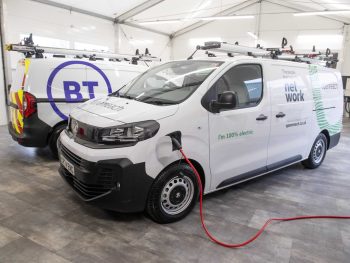Interview: How BT Group is electrifying its CV fleet
Telecoms giant BT Group announced the UK’s largest-ever commercial EV fleet order at the start of 2025. In the run-up to this year’s CV Show, fleet account director Nigel Allsop spoke to Van Fleet World about the group’s electrification approach and considerations.

BT Group fleet account director Nigel Allsop
BT Group operates one of the largest light CV fleets in the UK, with around 30,000 vehicles from vans to HGVs on its books.
In January this year, the group struck a record EV agreement, inking a deal to add 3,500 new electric vans to its fleet, bringing to the total to nearly 8,000 EVs.
The order is part of a larger consignment of 6,000 new vehicles, with more than half of the vans being EVs.
Fleet account director Nigel Allsop explains the rationale for decisions regarding electrification.
“We take into account fuel consumption, clean air zones (CAZ), service and maintenance, EV grants from the government, leasing costs and the length of the lease and the non-cost benefits,” says Allsop. “Then you need to weigh that up with the sustainability angle and of course the areas that most people are nervous about – the infrastructure in terms of keeping the teams on the road and the EV charging infrastructure.
“If you’ve got a good balance in terms of knowing where you’re moving towards in those directions, you know that you’ve got opportunities to bring more people into EVs and that the plan works out from a finance perspective, then the question is, why would you not?”
BT’s approach to those who would be directly affected by a shift to EVs has been to ask for volunteers who would like to switch to an EV and then tied that in with the ability to install a home charger.
“I think we’ve got about 188 different areas and sites where we have already got chargers and that is constantly evolving,” says Allsop.
Particularly where the BT Openreach fleet is concerned, Allsop recognises that many of their engineers are younger, more likely to change jobs and less likely to own their own property,
“Therefore we need to make sure that we’ve got enough networking coverage around the UK and Northern Ireland to make sure that we can really keep ourselves on the road,” he explains.

BT Group struck a record EV agreement in January, inking a deal to add 3,500 new electric vans
Then there are the service, maintenance and repair (SMR) considerations. “The downtime and the indirect costs are things that really need to be taken seriously, something that has to form part and parcel of the calculations,” says Allsop. “We are looking to do commercial deals and collaborations with other companies to make sure that, for instance, if we are using super-fast premium rate chargers during the day, we can work with companies that may work at night time and charge our vehicles at night.”
Allsop reckons that around 80% of the BT Group fleet could be serviced by an EV, but then there are other considerations too, such as whether heavier EVs are needed and how racking and tools will affect battery range, life and power utilisation.
“The beauty of us asking for people who would like to take an EV is that what you get then, on the bell curve of change, are the early adopters at the front of it, then the people who need to know what the facts and figures are about these early adopters, what’s being done to support on the network and then you get to the back end where it may not help to put someone in an EV,” says Allsop.
“You have to change the way you’re working, you do have to plan a bit further if you’re going a bit further afield, there’s no two ways about that. Sometimes that plan comes unstuck because other people are on a charger there, or the power’s not coming in as quickly as you’d like it to, but I think we need to look at that and make sure that we’re putting the right people in those vehicles first and foremost. We need to build the infrastructure and the supporting network to give ourselves space for the trickier parts of the country to support.”














Leave a comment